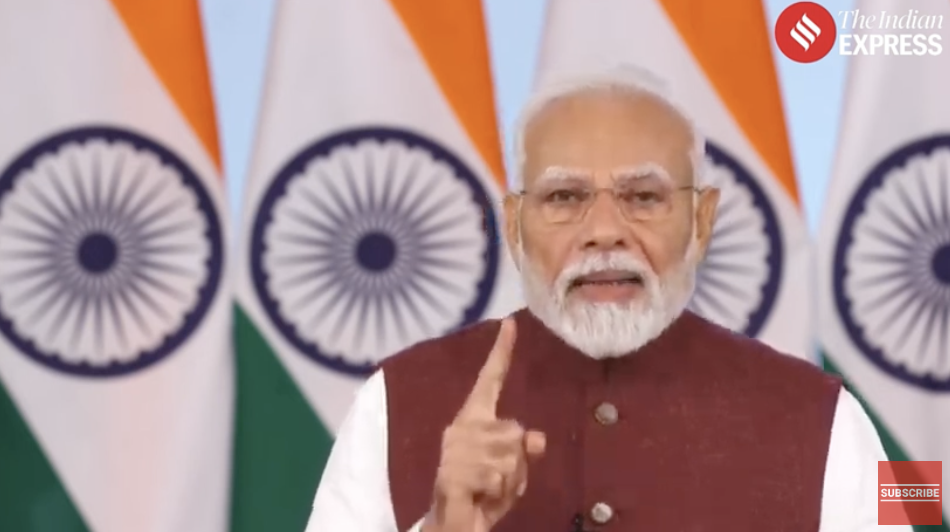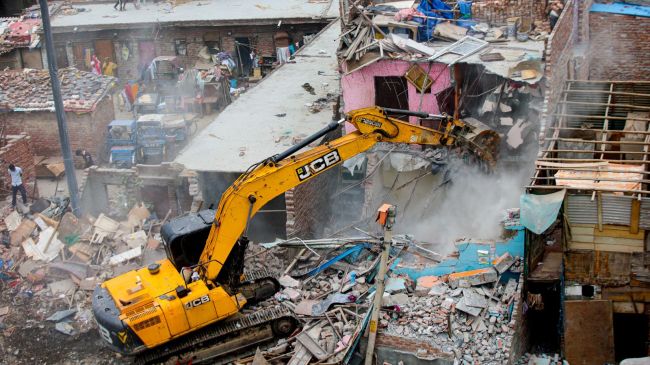
THE Cover Story (Hindutva’s war by other means, February 24) gives a true and vivid picture of the Sangh Parivar’s strategies.
It reminds one of the India’s first Prime Minister Jawaharlal Nehru’s warning about Hindu communalism. He said: Muslim communalism is much worse and stronger than Hindu communalism. But Muslim communalism cannot dominate Indian society and introduce fascism. That only Hindu communalism can. Your Cover Story has proved it right with various examples.
Bidyut Kumar Chatterjee Faridabad
UNDERLYING socio-economic tensions are the root cause of all sectarian clashes worldwide, be it in Northern Ireland, Bosnia, Iraq, Sri Lanka or India.
When there were communal clashes a few decades before 2002 in Gujarat, the media reported that the problem was the result of the clandestine return of Muslims who had migrated to Pakistan during Partition. With the population growing, the conditions will only get worse. Genocide is not a civilised solution.
Chudamani Ratnam New Delhi
THE political parties are behind communal violence. They play the communal card to strengthen their vote banks. Most political parties suffer from moral and ideological bankruptcy.
The radical outfits that create communal disharmony should be tackled by ensuring the rule of law.
P. Senthil Saravana Durai Vazhavallan, T.N.
HINDUTVA elements are playing a dirty and dangerous game. They do not want to accept the fact that India is a multi-religious and multicultural country.
While the Cover Story reports deal with the bigoted interventions in the curriculum, they do not speak of teachers’ role. A prejudiced teacher is more dangerous than a communal curriculum. Such teachers will carry their personal beliefs and prejudices into the classroom and interpret lessons accordingly. But the question is who will monitor teachers.
S.S. Rajagopalan Chennai
OUR Constitution gives us the right not only to follow our religion but also to refine it. So outfits such as the RSS should focus on bettering the lot of the community they claim to represent rather than inflaming the minds of the youth by saying that their religion is in jeopardy.
Sushil Kumar Aurangabad, Bihar
THE article Communal Curriculum in the Cover Story is quite prejudiced. It paints all the education reforms of the Gujarat and Karnataka governments with the same brush. While it is unwise to describe the minorities as India’s foremost problem in textbooks, there is nothing wrong in introducing the Bhagvad Gita in schools. Language and literature should not be the sole preserve of any religion. To quote the renowned Urdu poet Mirza Ghalib: Languages aren’t the properties of a single religion. A Hindu has as much right to learn and speak Urdu as Muslims have to learn Sanskrit.
Also, there is nothing wrong in opening cow pens (Sacred Cow). So long as the animals are given the kind of care and protection they need, even if it is in the name of religion, it is good. But the Madhya Pradesh government’s allocation of huge funds for these pens and the neglect of other animals should be condemned.
Ritvik Chaturvedi New Delhi
Frontline seems to have taken up cudgels on behalf of pseudo-liberals trying to show that cow protection is divisive and communal and teaching the Gita is some Hindutva agenda. The Gita is taught in famous management institutes abroad. Does this make them communal? The Gita has lessons for life. If anything, it enriches the reader.
Abhishek Prakash Bhopal
SOME of the positive RSS initiatives have been totally ignored in the Cover Story. Its work in areas such as tribal development cannot be ignored. The Ekal Vidyalaya scheme is working wonders in many tribal areas.
The charge of saffronisation of education in the BJP-ruled States is debatable. In that case, we should also be debating the question of reservation for the minority communities.
Ameya Phadke Thane, Maharashtra Age row
THE controversy over the Army chief, General V.K. Singh’s, age is most unfortunate (Age of controversy, February 24). Dragging the issue to the court has not only lowered his prestige but also undermined the authority of his office. This also shows that all is not well within the defence establishment.
SHAHABZ KHAN/PTI
One fails to understand why he raked up the issue when he was about to retire. It would be better that the General quits gracefully in the larger interests of India’s most disciplined force.
K.R. Srinivasan Secunderabad
THE age row has exposed what transpires within the hallowed corridors of the Army headquarters. One fact that is strikingly clear is the role of his predecessors in the episode. On the one hand, they kept Gen. V.K. Singh suitably mollified by not denying him his due promotions and, on the other, ensured that his tenure was truncated in such a manner.
Anil Joshi Nainital Uttarakhand
FOR an ordinary citizen if the exact date of birth is not known or if it is not in the records, then the admissible evidence is an affidavit filed before a magistrate duly supported by someone present at the time of his/her birth. This rule could have been applied here, but unfortunately the matter has taken a political turn.
Mahesh Kumar New Delhi
FINALLY, the Supreme Court has endorsed the stand of the government on the date of birth controversy. The General’s step of approaching a civil court may act like a precedent for future trivial Army problems. This should be put to an end.
Either the general should resign voluntarily for not getting what he wanted or the government should ask him to go on leave for the rest of his term.
S.R. Devaprakash Tumkur, Karnataka
THE correct age of an employed person, whatever be his position, is a material fact of his appointment. The age determines his date of retirement and the opportunity for others to succeed him.
Having two dates of birth and not providing the correct one with evidence or failing to get the correction done in time amounts to misconduct. An age dispute should not result in injustice to others. It is quite improper to demand a correction in the date of birth with a view to extending one’s tenure.
S. Raghunatha Prabhu ALAPPUZHA, KERALA Farmers’ suicides
THE cases of suicide by farmers in West Bengal are unfortunate (Distress & Death, February 24). The exact cause is not known, but the issue needs urgent attention. The Chief Minister has called it a conspiracy to defame the government.
The need of the hour is to support farmers by providing financial assistance, offering loan waivers, freeing them from the clutches of moneylenders and, more importantly, providing seeds and other agricultural inputs at subsidised rates.
Jayant Mukherjee Kolkata Pakistan
THERE is a new player in the power game in Pakistan the judiciary (Breathing Easy, February 24). It is accused of working at the behest of the army to dethrone the elected government.
The Supreme Court of Pakistan deciding to charge Prime Minister Syed Yusuf Raza Gilani with contempt of court is the first of its kind in the history of Pakistan on the issue of reopening graft cases against President Asif Ali Zardari.
The court seems to be overreaching itself on this issue. The Swiss authorities have already closed the cases of graft. Under the National Reconciliation Ordinance (NRO), 2007, Zardari enjoys immunity from prosecution not only in Pakistan but all over the world.
The Chief Justice of the Pakistan Supreme Court himself is a beneficiary of an amnesty deal. He was reinstated by the Zardari government. If the Supreme Court has struck down the NRO, then the Chief Justice and other judges should also resign on moral grounds.
Deendayal M. Lulla Mumbai Sikkim
A J T JOHNSINGH
A WALK in Sikkim was an engaging read (February 10). The pictures of rhododendrons were captivating. Sikkim’s rich biodiversity has always attracted tourists in all seasons. Chief Minister Pawan Kumar Chamling’s contribution to the promotion and preservation of the State’s natural treasures and traditional culture must be appreciated.
Janga Bahadur Sunuwar Bagrakote West Bengal India
JUSTICE Markandey Katju’s essay What is India (February 10) is based on the erroneous assumption that India has been a country since the beginning. The essay does not deal with the nation-state which came into existence on August 15, 1947, but with the subcontinent, which is a rather geographical concept. Indian history books are full of instances where terms such as India, Bharat and Hindu are used carelessly.
The impact of the Islamic invasions after A.D. 1191 and the British rule later is felt today in the large Muslim (and small Christian) population. Even then, the non-Muslim, non-Christian population (collectively called Hindus) is more than 80 per cent.
And this diversity is not unique to India. Major countries such as the U.S., Russia and China have sizable minority populations. They are secular out of choice, not compulsion as is emphasised in the article. Otherwise, the essay is very informative.
Vinod K. Jhunjhunwala Delhi ANNOUNCEMENT
Letters, whether by surface mail or e-mail, must carry the full postal address and the full name, or the name with initials.
This story first appeared on frontline.thehindu.com






